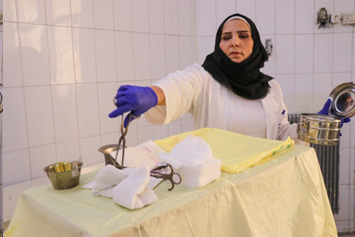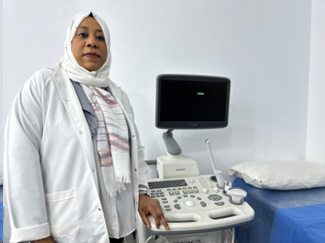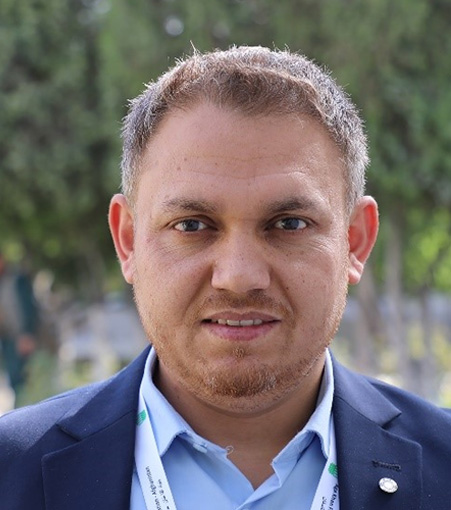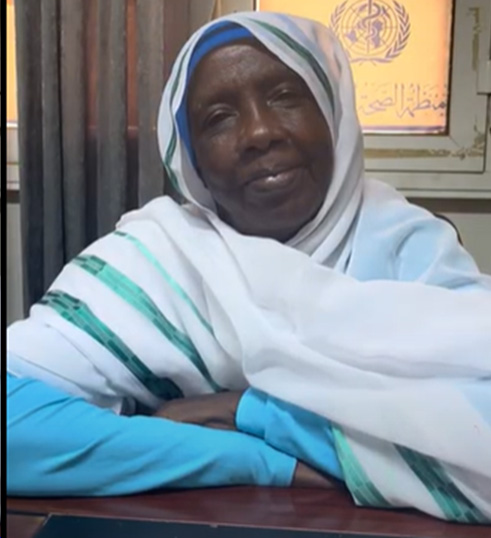World Health Day 2025: heroes of maternal health

 Nurses and midwives are the backbone of health care systems around the world, providing essential care to individuals and communities. In many places, they are the first point of contact for patients, and ensure continuity of care, especially for mothers and newborns. Their role becomes even more critical in remote, underserved and conflict-affected regions where they are often the only health care providers available. In these areas, they not only provide essential medical services but offer emotional support and guidance, becoming lifelines for communities.
Nurses and midwives are the backbone of health care systems around the world, providing essential care to individuals and communities. In many places, they are the first point of contact for patients, and ensure continuity of care, especially for mothers and newborns. Their role becomes even more critical in remote, underserved and conflict-affected regions where they are often the only health care providers available. In these areas, they not only provide essential medical services but offer emotional support and guidance, becoming lifelines for communities.
As we mark World Health Day 2025, it is essential to recognize the tireless efforts of health workers in the Eastern Mediterranean Region, and particularly nurses and midwives, the majority of whom are women, who make up more than half the total health workforce. Their commitment to serving their communities is unwavering, their contributions indispensable.
Midwives have always been the cornerstone of maternal care in the Eastern Mediterranean Region. Their workloads are often heavy, the resources at their disposal limited. In the words of Batoul Adnan Al-Naib, a midwife in the Syrian Arab Republic:
It can be hectic because we are the only operating room in a large area. We do everything we can to assist everyone who needs help.

The Eastern Mediterranean Region, with its often challenging political, social, economic and demographic contexts, faces longstanding shortages in the health workforce. If current trends continue, the Region will account for more than 20% of the estimated global shortfall of 10 million health workers by 2030.
In Libya, Aisha Khir, Head of the Nursing Department at Benghazi Children's Hospital, describes the dire staffing shortages that threaten maternal and newborn care.
Like most public hospitals in Libya, we face a shortage of nurses in our hospital. Yet despite all the challenges, so far we have managed to fill the gaps with additional shifts and teamwork to save more lives.

Health workforce shortages are compounded by geographical and skills mix imbalances, inadequate training and education capacity limited employment opportunities, weak governance and regulation and insufficient information and evidence to inform policies and strategies. In many cases, education and training gaps at the undergraduate and postgraduate level hinder access to essential health services, particularly in primary care.
Mohammad Asif Hussainyar, a board member of the Afghanistan Nurses and Midwives Council, calls for urgent action and targeted investment in education:
We need national and international organizations to invest in quality education for nurses, leadership and career development.

Such investments will not only help address current challenges, they bring long-term benefits. Strengthening nursing and midwifery improves health outcomes, reduces maternal and neonatal mortality and yields significant economic and social benefits for communities, helping secure the future of health care.
In countries facing acute and protracted crises, health workers continue to provide essential care, often at great personal risk. In such challenging circumstances, the contributions of nurses and midwives become even more vital.
In Sudan, which is facing the largest humanitarian crisis in the world, midwife Dohya Mohamed Adam has managed a shelter centre since the beginning of the conflict in 2023. She describes the responsibilities she faces on a daily basis:
There are cases when women in labour cannot reach the hospital so I have to provide emergency assistance myself. In other cases, due to the severity of their condition, I stabilize them and transfer them to the hospital for specialized surgical procedures. During antenatal care, we conduct follow-ups over the phone, provide advice, distribute advisory brochures and carry out health awareness activities on issues such as female genital mutilation. We are the backbone of maternal health in shelter centres.

The testimonies of health care workers underline how important it is to strengthen and safeguard the health workforce. The WHO Regional Office for the Eastern Mediterranean has launched a regional flagship initiative, Investing in a resilient and sustainable health workforce, proposing Region-wide strategic action complemented by high value-added interventions and support tailored to country contexts. The initiative focuses on enhancing the health workforce as a key enabler to achieve universal health coverage, the health-related SDGs and health security by 2030. A major aim of the initiative is to increase investment in the health workforce across the Region to improve health workforce education and training recruitment and retention. This will not only support significant improvements in population health but also boost economic growth and development.
It is time for governments, policy-makers and stakeholders to invest in nursing and midwifery, strengthen education, training and regulatory mechanisms, improve working conditions and ensure the safety and well-being of health workers. Beyond strengthening health services, investing in the health workforce, especially in nursing and midwifery, improves women’s economic empowerment and participation.
By empowering nurses and midwives, we strengthen health systems for everyone.


